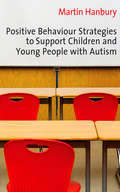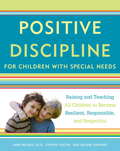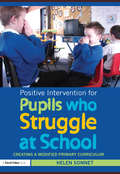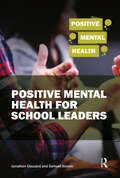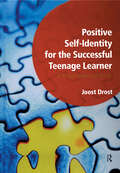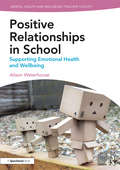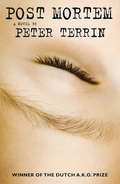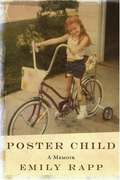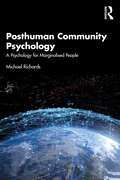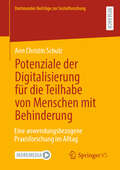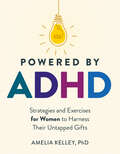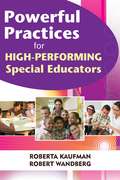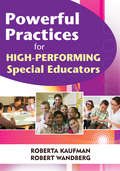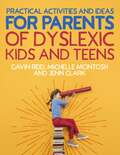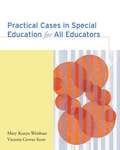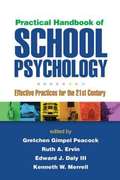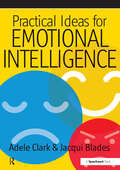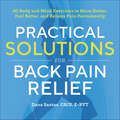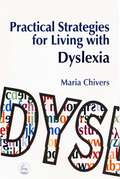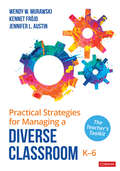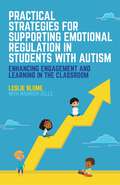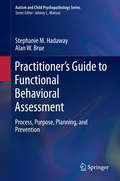- Table View
- List View
Positive Behaviour Strategies to Support Children & Young People with Autism
by Dr Martin HanburyTeachers in mainstream schools are increasingly accommodating pupils on the autistic spectrum in their classrooms, and this books offers advice on one of the most difficult aspects of teaching children and young adults with autism - understanding and managing their often challenging behaviour. This book: o explores issues surrounding behaviour support o supplies INSET materials for developing practice in behaviour management o contains self-audit tools for practitioners o gives practical advice on developing an appropriate learning environment o provides guidance on how to promote positive behaviour o contains tried and tested photocopiable material and practical resources. Essential reading for all teachers and teaching assistants working with pupils on the autistic spectrum, this book is based on the sound advice of an experienced practitioner who understands the reality of managing challenging behaviour in the classroom. Martin Hanbury is head of a special school, a regional tutor on the Webautism course at the University of Birmingham and works for the National Autistic Society.
Positive Discipline for Children with Special Needs
by Jane Nelsen Steven FosterOver 2 Million Positive Discipline Books Sold! A Positive Approach To Helping Children With Special Needs Realize Their Potential. Every child deserves to lead a happy and fulfilling life. For parents and teachers of children with special needs, helping their child to not only negotiate daily challenges, but to live fulfilling, meaningful lives, can be the most difficult challenge they will face. Over the years, millions of parents and teachers have come to trust Jane Nelsen's classic Positive Discipline series for its consistent, commonsense approach to childrearing. Now, the bestselling series addresses the specific challenges that parents and teachers of children with special needs face, and offers them straightforward advice for supporting them in positive ways. In these pages are practical solutions to challenges such as: Learning to look beyond diagnostic labels; Believing in each child's potential regardless of his/her stage of development; Helping children integrate socially and interact with their peers; Coping with the frustration that inevitably occurs when a child is being difficult; Strengthening a child's sense of belonging and significance; And Many More! Use this book to answer such questions as: * How do you accommodate a disability, while still teaching a child to try their best? * How do you help a child cope with anger they may have trouble expressing, especially when that anger may on some level be justified? * How do you teach a child who may struggle with seemingly straight forward tasks to contribute to the world around them in a way that will be meaningful to them? "If you are raising or teaching a child with special needs, this book is a must-read. As the mother of a child with autism, my hopes and dreams for my son were no different than those of other parents. I wanted a parenting approach that helped my child grow up to be self confident, happy, and prepared for success in relationships, work, and life. I also needed practical, effective methods for addressing the significant, challenging behaviors I faced on a daily basis. Finally, in this amazing book, I found both....Thank you, thank you, thank you to the authors of this groundbreaking book." - Rachel Fink Parks, MS, PCC.
Positive Intervention for Pupils who Struggle at School: Creating a Modified Primary Curriculum
by Helen SonnetPositive Intervention for Pupils who Struggle at School provides the resources and information primary teachers need to ensure a happy and effective school experience for all children, particularly those who are seriously struggling. This tried and tested intervention is designed specifically for those children who have been through all the standard interventions, to no avail, and who are now in danger of being excluded.Explaining the thinking behind the suggested modified curriculum, this innovative book considers the reasons why certain children experience difficulties and looks at how this curriculum addresses their needs and enables them to develop personal, social and emotional skills. The activities are chosen to develop and enhance skills for learning, including listening, speaking, concentrating, a positive disposition and a willingness to take on new challenges. Helen Sonnet demonstrates how success has been achieved through this strategy and provides valuable information to help teachers to set up similar groups in their own schools, including how to: ensure firm foundations for the group select the children who will benefit most establish the structures and routine of a successful group assess the children’s progress reintegrate children into their mainstream classes effectively. In line with government initiatives this important and effective intervention strategy can make the world of difference, giving teachers new, proven strategies to enable them to support children who are struggling in mainstream primary schools.
Positive Mental Health for School Leaders (Positive Mental Health)
by Jonathan Glazzard Samuel StonesThe mental health of school leaders and managers is just as important as the well-being of those they teach and support. Recent research reveals some alarming statistics, including that 56% of senior leaders have experienced mental ill health in the last year. This book examines a range of relevant issues including workload, inspections, partnerships and approaches to leadership and management in order to address some of these concerns and provide comprehensive guidance and workable, evidence-informed strategies to support those with leadership roles in schools and colleges.
Positive Self-Identity for the Successful Teenage Learner: A Programme or Work
by Joost DrostUsing a narrative approach, teenagers are challenged to learn about themselves, about each other and about how to take control of their lives. The learning is presented in a series of lessons with comprehensive facilitator instructions and materials designed to engage teenagers in both group and individual activities. A story and characters provide a full range of emotions, from the overwhelming feelings of angst and anger to empathy, friendship support and happiness. The material complements the secondary SEAL agenda. A comprehensive guide will help the facilitator to capture the student's emotional world and turn their energies into meaningful and constructive projects. It also provides students with tools to practice and develop their emotional and social intelligence.
Positive Working Relationships in School: Supporting Emotional Health and Wellbeing (Mental Health and Wellbeing Teacher Toolkit)
by Alison WaterhouseOne of the five books in the Mental Health and Wellbeing Teacher Toolkit, this practical resource focuses on developing the skills necessary to build and maintain successful relationships. The book offers research-driven, practical strategies, resources and lesson plans to support educators and health professionals. Chapters span key topics including Communication, Respecting Yourself and Others, Resolving Conflict and Team Building. A complete toolkit for teachers and counsellors, this book offers: • Easy-to-follow and flexible lesson plans that can be adapted and personalised for use in lessons, smaller groups or 1:1 work. • Resources that are linked to the PSHE and Wellbeing curriculum for KS1, KS2 and KS3. • New research, ‘Circles for Learning’, where the introduction of baby observation into the classroom by a teacher is used to understand and develop self-awareness, skills for learning, relationships, neuroscience and awareness of others. • Sections on the development of key skills in communication, skills for learning, collaboration, empathy and self-confidence. • Learning links, learning objectives and reflection questions. Offering research-driven, practical strategies and lesson plans, Positive Relationships in School is an essential resource book for practitioners looking to have a positive impact on the mental health and wellbeing of the children and young people in their care: both now and in the future.
Post Mortem
by Peter TerrinEmiel Steegman, an unknown writer with a handful of novels to his name, is seeking a way to escape a dinner with Estonian colleagues. Although things are plodding along quite happily, he cancels at the last moment "due to a rather difficult time for the family".A nasty feeling immediately comes over him: is he inviting trouble for his family in doing so? And what if a biographer stumbled on this? Would he not then suspect that something significant had happened in his life? The thought gives him a great idea for a new novel about a successful author, T, who becomes famous with an existential crime novel and increasingly worries about what his future biographer will write about him, so he withdraws entirely from public life.But Steegman's initial misgivings prove well founded. Because fate does strike. One afternoon, his daughter Renée falls asleep and it is impossible to wake her . . .
Post Mortem
by Peter TerrinEmiel Steegman, an unknown writer with a handful of novels to his name, is seeking a way to escape a dinner with Estonian colleagues. Although things are plodding along quite happily, he cancels at the last moment "due to a rather difficult time for the family".A nasty feeling immediately comes over him: is he inviting trouble for his family in doing so? And what if a biographer stumbled on this? Would he not then suspect that something significant had happened in his life? The thought gives him a great idea for a new novel about a successful author, T, who becomes famous with an existential crime novel and increasingly worries about what his future biographer will write about him, so he withdraws entirely from public life.But Steegman's initial misgivings prove well founded. Because fate does strike. One afternoon, his daughter Renée falls asleep and it is impossible to wake her . . .
Poster Child: A Memoir
by Emily RappEmily Rapp was born with a congenital defect that required, at the age of four, that her left foot be amputated. By the time she was eight she'd had dozens of operations and her entire leg below the knee had been amputated. She had also become the smiling, always perky, indefatigable poster child for the March of Dimes, and spent much of her childhood traveling around the Midwest making appearances and giving pep talks. All the while she was learning to live with what she called "my grievous, irrevocable flaw," and the paradox that being extraordinary was the only way to be ordinary. Poster Child is Rapp's unflinching, brutally honest and often darkly humorous account of wrestling with the tyranny of self-image as a teenager and then ultimately coming to terms with her own body as a young woman. It's about what it's like to live inside a broken body in a society that values beauty above almost everything else.
Posthuman Community Psychology: A Psychology for Marginalised People
by Michael RichardsPosthuman Community Psychology is an exploration of mainstream psychology through a critical posthumanity perspective, examining psychology’s place in the world and its relationship with marginalised people, with a focus on people with disabilities. The book argues that the history of modern psychology is underpinned by reductionism and individualism, which is embedded within the contemporary psychology that we know today despite the challenges from critical and community psychologists who seek a more empowering, inclusive, and activist psychology. The posthuman community psychology ideas that emerge in this book examine and intersect with mainstream psychology, critical and community psychologies, critical posthumanities and disability studies to propose an imaginative, reflective, and relational new psychology that represents a collection of possibilities that do not remain entrenched in older ways of thinking about humans and human connections. Richards proposes that psychology has the potential to evolve and make a powerful and profound difference for marginalised people, but a genuine desire for change from psychologists is essential for this to happen. Illustrating the important considerations needed when examining the relationship between the discipline of psychology and marginalised people, this book is fascinating reading for community psychology students and academics, aspiring professional psychologists, community workers, and policy makers.
Potenziale der Digitalisierung für die Teilhabe von Menschen mit Behinderung: Eine anwendungsbezogene Praxisforschung im Alltag (Dortmunder Beiträge zur Sozialforschung)
by Ann Christin SchulzDigitalisierung betrifft alle Lebensbereiche. Aber nicht alle Personen können diesem Prozess adäquat begegnen und sie werden zunehmend aus der Gesellschaft ausgeschlossen. Ihnen droht also (digitale) Exklusion. Besonders im Jahr 2020 erlangte die Digitalisierung durch die Coronavirus-Pandemie einen Aufwind, indem eine Vielzahl analoger Praktiken in den digitalen Raum verlagert wurden. Dadurch entstanden Chancen auf Teilhabe, jedoch stieg auch die Gefahr der Exklusion - besonders für Personen, die prädisponiert für Marginalisierung sind, wie die in diesem Buch zugrundeliegende Zielgruppe "Menschen mit geistigen Behinderungen" (MmgB). Aufgrund dessen ist es erforderlich, die gesellschaftliche Teilhabe zu untersuchen. Ann Christin Schulz stützt sich dabei auf den sozialen Transformationsprozess der Digitalisierung. Im Vordergrund steht die subjektorientierte Betrachtungsebene mit einem praxistheoretischen Ansatz, indem in Form von Beobachtungen und eingebetteter Forschung ein Jahr in einer Einrichtung einer Behindertenhilfe geforscht wurde. Die Autorin zeigt u.a., welche Chancen und Risiken Digitalisierung für die Teilhabe von MmgB bietet, welche sozialen Praktiken sich mit digitalen Technologien entfalten und welcher Einfluss der soziale Kontext von MmgB auf ihre Teilhabe hat.
Powered by ADHD: Strategies and Exercises for Women to Harness Their Untapped Gifts
by Amelia KelleyPractical strategies and exercises that empower women with ADHD to use their gifts for everyday successBacked by the latest research on the benefits that exist with having ADHD, Powered by ADHD is a practical road map for women to take charge and harness their enormous strengths and talents. With more than 20 years of experience working with neurodivergence, Dr. Amelia Kelley offers guidance, skills, and tools that emphasize flexibility and self-compassion to help women develop a positive self-image and see immediate results in all areas of life. Powered by ADHD features: A complete package for women with ADHD—grounded in the latest science and research; positive and motivating support; practical guides, tools, and strategies Practical guidelines to the top ADHD gifts, including how to effectively use these strengths to meet productivity and accomplish goals Real-life adult ADHD challenges and clear strategic solutions for key areas of a woman&’s life—work, home, relationships, finance, motherhood/caretaking, and more Step-by-step and easy-to-follow exercises that are designed to work with and for the ADHD brain
Powerful Practices for High-Performing Special Educators
by Robert Kaufman Robert WandbergSpecial education teachers face unique challenges, especially when they are just beginning. This essential resource offers special educators a blueprint for dealing with the most common challenges they face both in the classroom and in the larger school environment. These research-based strategies help teachers meet the academic needs of diverse students with disabilities (including those who are also English language learners) in areas such as setting up a classroom, managing student behavior, designing effective instruction, incorporating technology, embracing diversity, and more. Each chapter features: -An overview and objectives -A brief research review -Step-by-step strategies that can be used immediately -Examples and scenarios from real teaching experiences -Self-assessments and reflections This all-in-one reference book offers the tools, strategies, and support special educators need for success in their first year and every year thereafter!
Powerful Practices for High-Performing Special Educators
by Roberta C. Kaufman Robert W. WandbergThis valuable resource addresses the unique challenges faced by special education teachers in today's inclusive classrooms by offering powerful, research-based tools and strategies.
Practical Activities and Ideas for Parents of Dyslexic Kids and Teens
by Gavin Reid Michelle McIntosh Jenn ClarkThis book contains dyslexia-friendly practical activities and ideas that can be readily accessed by parents of dyslexic children and teens, to support their learning in ways that work for them. It includes 70 activities to boost dyslexic learners' reading, writing, spelling and executive functioning, as well as aspects which are often overlooked, such as emotional wellbeing, memory and social communication, which are fundamental to self-esteem and positive education experiences.The authors, experienced practitioners in this field, equip parents to support and monitor their child's progress and work through the activities together. Accessible, motivating and engaging, this is an essential tool for supporting dyslexic students of all ages.
Practical Cases in Special Education for All Educators
by Mary Konya Weishaar Victoria Groves ScottPractical Cases in Special Education for all Educators focuses in on how general educators can and should become active participants in the education of children who have disabilities, by providing students with much needed practical applications of how general and special educators must work together and become involved in the education of all children.
Practical Handbook of School Psychology
by Gretchen Gimpel Peacock Ruth ErvinBringing together leading authorities, this state-of-the-science handbook delves into all aspects of problem-solving-based school psychology practice. Thirty-four focused chapters present data-based methods for assessment, analysis, intervention, and evaluation, with special attention given to working in a response-to-intervention framework. Tools and guidelines are provided for promoting success in key academic domains reading, writing, and math. Social-emotional and behavioral skills are thoroughly addressed in chapters on self-management interventions, peer and family support, cognitive-behavioral interventions, medication use, and more. This accessible work is an invaluable reference for practitioners and an ideal resource for school psychology training programs.
Practical Ideas for Emotional Intelligence
by Adele Clark Jacqui BladesThis book covers a wide range of emotional literacy topics relevant to todays young people and can be used in any setting by learning mentors and other professionals. Each topic includes group and individual session activities, solutions to problems, take home tasks and tips for the professional. It can be used when designing and implementing individual behavior plans and helping young people overcome the challenges in life. It is unique in that a professional in any setting can readily adapt the ideas to their requirements. The topics covered are: profiling, changing, behavioral change, self-esteem, bereavement, family change, study skills, stress busting, motivation, self learning, drug awareness, bullying, school refusal and frustration. The book contains ideas and suggestions which can be readily adapted by the professional to best suit their setting. It is one of the few resources which cover all aspects of emotional intelligence for all ability groups.
Practical Solutions for Back Pain Relief: 40 Mind and Body Exercises to Move Better, Feel Better, and Relieve Pain Permanently
by Dana SantasRelieve back pain with 40 easy-to-follow mind-body exercises from Practical Solutions for Back Pain ReliefWhether you've recently injured your back or suffer from chronic discomfort, you know the impact pain has on your daily life. In Practical Solutions for Back Pain Relief, "mobility maker" Dana Santas CSCS, E-YRT shares the physical and mental exercises she teaches professional athletes to relieve your back pain without drugs or surgery. With exercises designed to help you build the strength and flexibility you need to support healthy, pain-free movement throughout your spine, this is a proactive plan to heal from back pain.Practical Solutions for Back Pain Relief includes:Back Pain Basics explaining how our backs work and why they hurt40 Illustrated Exercises improving posture, mobility, core strength, and pain reliefMind-Body Tips and Strategies relieving pain and preventing it in the futureStrengthen your core, reduce pain, and heal your back with the exercises from Practical Solutions for Back Pain Relief
Practical Strategies for Living with Dyslexia
by Maria Chivers'This little book does exactly what it sets out to do. It spells out all you need to know about different methods and strategies for treating dyslexia. So, if you want to know more about the many approaches to helping someone with dyslexia, then read this book. At the end of the day, you will be better informed to choose a way to suit your child. It is encouraging to read her list of famous people with dyslexia. It includes Hans Christian Anderson, Albert Einstein, Winston Churchill, Agatha Christie, Jeremy Irons, Jackie Stewart and Richard Branson. They haven't done too badly, have they?' - www.family2000.org.uk 'This readable and useful little book has been written by a mother of two dyslexic sons. She writes about the hard road she travelled to find help and support for them. The book covers most of the questions that the parents of a dyslexic child would want answered, but it is just as useful to professionals who have a dyslexic child in their classroom or setting. The importance of early identification is stressed and the author provides useful information about tests which can be administered to children as young as four years old. There are informative chapters about the various successful techniques and strategies for working with dyslexic children, ranging from the well-publicised rose-coloured spectacles to the part played by a special diet.' - Nursery World Over the years, many quick fix approaches to cure dyslexia have been developed and used. These 'miracle cures' have offered hope to many parents who are left disillusioned by the school system and health service. With no other way to turn, many parents spend more and more money on special glasses, vitamins, exercises and specialist advice, but do they actually work? Written by a parent of two dyslexic sons, who herself searched for anything that would 'cure' them, this new book is a practical guide to dyslexia's many 'miracle cures'. Practical Strategies for Living with Dyslexia suggests that early identification of this condition may be the key. Dyslexia is often not diagnosed until children have started school, yet testing is now available from the age of four-and-a-half. On top of this many dyslexics also have eye and ear problems that go undetected, which further exacerbates the problem. Looking at the possible remedies available, such as tinted glasses, nutritional supplements and exercising, and considering the benefits of early identification of dyslexia, this book will be an essential practical resource for both the parents of, and the professionals who work, with people with dyslexia.
Practical Strategies for Managing a Diverse Classroom, K-6: The Teacher′s Toolkit
by Jennifer Austin Wendy Murawski Kennet FröjdYour Teacher Toolkit for Better Teaching and Learning Every educator needs a toolkit of strategies to ensure that students of different abilities, backgrounds, and learning profiles achieve success in the classroom. Rather than requiring busy educators to read copious amounts of research and theory first, Practical Strategies for Managing a Diverse Classroom flips the script, providing the answers and tools you need up-front so you can implement them immediately. Inside, you′ll find: Powerful vignettes and common scenarios found in any inclusive classroom Concrete strategies for each classroom scenario Research and evidence for each strategy, explaining how and why it works An exploration of cutting-edge topics such as co-teaching, cooperative learning, applied behavior analysis, SEL, and more Additional resources, applications, and activities for book studies or for educators who want to go deeper into the topics that appeal to them the most Written by a team of experienced educators with varied backgrounds, Practical Strategies for Managing a Diverse Classroom offers practical strategies for effective teaching and learning, better classroom management, and strengthened student engagement.
Practical Strategies for Managing a Diverse Classroom, K-6: The Teacher′s Toolkit
by Jennifer Austin Wendy Murawski Kennet FröjdYour Teacher Toolkit for Better Teaching and Learning Every educator needs a toolkit of strategies to ensure that students of different abilities, backgrounds, and learning profiles achieve success in the classroom. Rather than requiring busy educators to read copious amounts of research and theory first, Practical Strategies for Managing a Diverse Classroom flips the script, providing the answers and tools you need up-front so you can implement them immediately. Inside, you′ll find: Powerful vignettes and common scenarios found in any inclusive classroom Concrete strategies for each classroom scenario Research and evidence for each strategy, explaining how and why it works An exploration of cutting-edge topics such as co-teaching, cooperative learning, applied behavior analysis, SEL, and more Additional resources, applications, and activities for book studies or for educators who want to go deeper into the topics that appeal to them the most Written by a team of experienced educators with varied backgrounds, Practical Strategies for Managing a Diverse Classroom offers practical strategies for effective teaching and learning, better classroom management, and strengthened student engagement.
Practical Strategies for Supporting Emotional Regulation in Students with Autism: Enhancing Engagement And Learning In The Classroom
by Leslie Blome Maureen ZelleFor professionals who work with students on the autism spectrum in inclusive classroom settings, supporting emotional regulation is key. This practical guide outlines cognitive and language strategies that support emotional regulation, which the authors have found successful with their students with autism, supported by research that shows why they work. The focus in this book is on the emotional state of the child as opposed to controlling behaviours. The guidelines and strategies provided help students with prediction and make the expectations of them clear, empowering children by giving them choices. Examples of how to use each strategy are given, alongside tips for application. The book also includes sample goals for regulation, information on therapy techniques that work and a 'cheat sheet' overview of the strategies, creating a clear and concise guide to engaging and enhancing learning in the classroom.
Practitioner's Guide to Functional Behavioral Assessment
by Alan W. Brue Stephanie M. HadawayThis practical guide introduces functional behavioral assessment as a critical tool in planning interventions to reduce disruptive and other problematic behaviors. The book offers proven methods and strategies as a four-stage protocol in an easy-to-follow format with checklists, Q&A sections, applications, and an extended case example including an assessment report and intervention plan. Step-by-step instructions are delivered in an accessible teaching style, making all phases of assessment equally manageable. And although functional behavioral assessment is typically associated with schoolchildren, this material is also useful for working with adults in residential and community settings. The Guide gives readers: The basics of functional behavioral assessment. Guidance in preparing for conducting a functional behavioral assessment. An overview of assessment methods: formal and informal measures, interview, and observation. A framework for translating assessment data into an appropriate intervention plan. In-depth understanding of the role of prevention in behavioral intervention. A kit of questionnaires, worksheets, and other ready-to-use resources. Practitioner's Guide to Functional Behavioral Assessment is an essential resource for clinicians and related professionals as well as researchers and graduate students in school and clinical child psychology; behavior therapy; assessment, testing and evaluation; special education; and educational psychology.
Prairie School (I Can Read Series)
by AviIt's the 1880s, Noah works hard on the family farm and roams free on the Colorado prairie. One day his Aunt Dora arrives to give him some schooling. Noah doesn't think he needs it. What use is reading on the prairie? But what Noah discovers will change his life forever.
